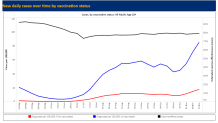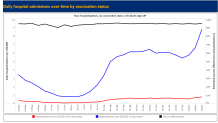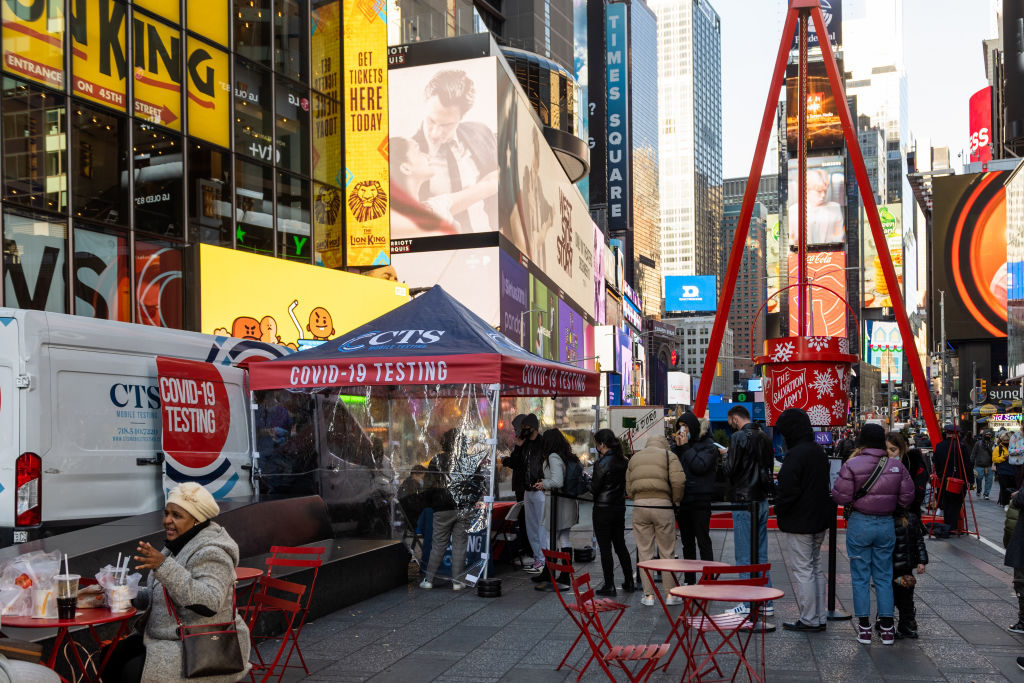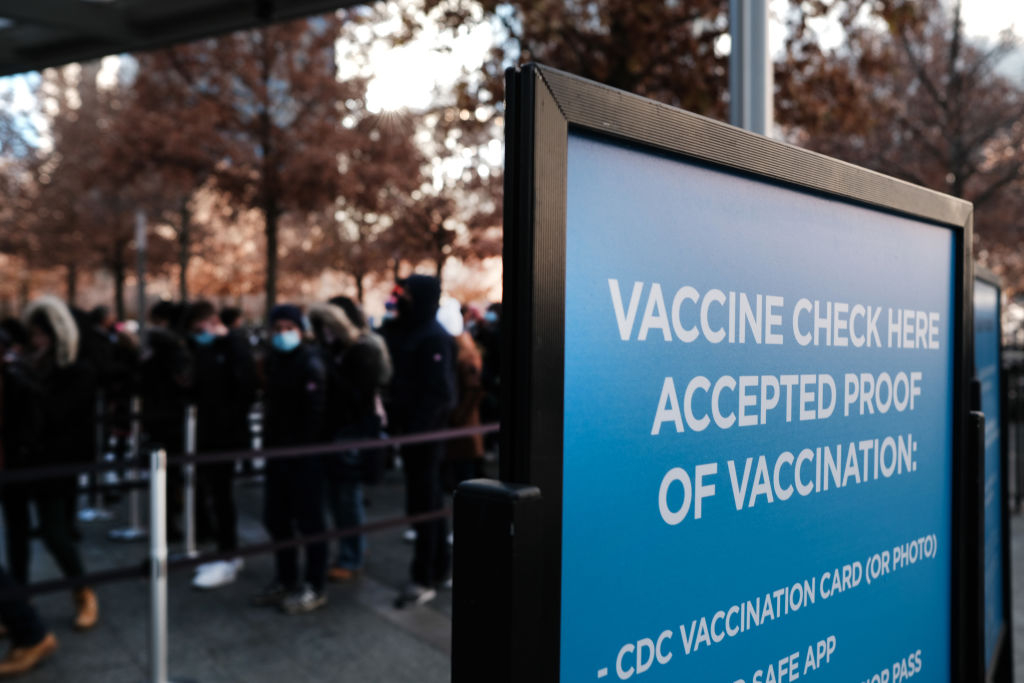What to Know
- Gov. Kathy Hochul says stricter measures are needed to curb COVID spread across the state; delta has driven hospitalizations to months-long highs while omicron may be fueling the latest case surge
- Daily COVID deaths in NY topped 50 (54) on Thursday for the first time in months, while the daily caseload topped 12,400 for the first time since late January -- and hospitalizations are up 86% in the last month
- Omicron has now been identified in at least half of U.S. states and 60-plus countries; preliminary data on severity has been encouraging, Fauci says, but delta continues to drive up the hospitalization rate
BREAKING UPDATE: NY Mask Mandate for All Indoor Public Places With No Vaccine Requirement Starts Monday
Gov. Kathy Hochul is expected to announce new COVID measures for New York Friday as the state faces its most significant viral surge in more than half a year, though she didn't immediately indicate what those efforts might involve.
They could be related to masks or potentially to vaccinations or another element of the ongoing pandemic battle. The Democrat was vague about her plans, saying only that she'd be announcing a policy change around COVID because of the numbers. More details are expected at her 10 a.m. briefing.
Get Tri-state area news delivered to your inbox.> Sign up for NBC New York's News Headlines newsletter.
It comes a day after the Democrat announced nearly three dozen upstate New York hospitals had to suspend non-essential elective procedures to secure bed capacity, part of what she described as a preemptive strike to "fight this impending surge."
COVID-19 hospitalizations across the state are at their highest levels since late April and have soared 86% in the last month alone, the latest data shows. Hochul and health experts say that's a reflection of the still omnipresent grip of delta, which accounts for 99% of all genetically sequenced positive samples in New York -- and the nation -- and has been scientifically linked to more severe cases of infection.
Daily COVID deaths in the state topped 50 (54) on Thursday for the first time in months, while the daily caseload topped 12,400 for the first time since late January. The latter increase could be reflective of omicron's spread throughout the state. Hochul and New York City leaders have said community transmission appears to be well underway. While just 20 cases statewide have been detected so far (13 of them in New York City), officials believe the actual number is significantly higher.
Those across-the-board upticks combined with the looming threat of holiday-related spikes warrant intense, early action, Hochul said.
The previously announced order to suspend elective surgeries is designed to ease capacity strains on hospitals as COVID-19 cases surge. It only applies to hospitals that have less than 10% bed capacity available, many of which are in areas where Hochul says lower vaccination rates correlate with the higher, concerning metrics.
"We continue to see an uptick in hospitalizations and this is a trend. You can draw a direct correlation between vaccination rates in an area and the number of hospitalizations," Hochul said Thursday. "And we know it's the indoors, the colder temperatures, but also the areas where people are more likely to be vaccinated."
Hochul said the state will reassess the surgery pauses on Jan. 15 because she doesn't want to order long-term changes in protocol without an end date or a set time to reevaluate the situation.
Even in cases where vaccination rates are higher, COVID's recent spread, whether omicron-induced or otherwise, is outpacing those dose rates. While more data is needed to determine whether omicron is linked to more severe outcomes or reduced vaccine efficacy, experts say it certainly appears to be more infectious than earlier strains, possibly even more infectious than delta.
The CDC said this week that of the 40-plus U.S. people who have been found to be infected with omicron so far, more than 75% of them were vaccinated. Breakthrough infections have been rising in New York since early November, though still account for a fraction of new infections compared with the non-vaccinated.

There has been an uptick in hospitalizations among vaccinated New Yorkers but it's meager -- and the discrepancy between hospitalizations among non-vaccinated and vaccinated New Yorkers is far more significant than the infection one.
Importantly, the vaccine efficacy rate in terms of new cases and hospitalizations has not changed since early November for those aged 50 and older. In fact, it's up slightly compared with October, an encouraging sign for the most vulnerable. For those aged 18 and 49, though, it's marginally down, the latest state data shows.

A number of local governments where omicron has been detected have intensified COVID efforts in the last week or so in an effort to curb the spread.
New York City's mayor outlined a strictest-in-the-nation vaccine mandate earlier this week that is set to take effect on Dec. 27, while new vaccine requirements for kids under 12 go into effect on Tuesday.
In Oneida County, where two omicron cases have been detected, officials will require masks to be worn in indoor public places and for temperature checks to be conducted at social gatherings taking place outside of private residences starting Monday. There will be an opt-out if proof of vaccine is required for entry.
More Coverage
“We expect these numbers to continue to rise, and at this point, we are prepared to say what we have is community spread,” Hochul said Thursday. “It is not coming from people who have traveled.”
Both she, de Blasio and health officials across the country have upped their urgency around vaccination and boosters in recent weeks. That message has only grown more urgent in the last few days at all levels of government.
Half of U.S. states and more than 60 countries have now detected omicron, New York's health commissioner said Thursday. She said early evidence does show vaccines protect against severe COVID illness and death linked to the new variant.
More than 81% of New York's adult population is fully vaccinated, CDC data shows, though that number plunges when it comes to the youngest eligible for shots. Just 65% of kids aged 12 to 17 are fully vaccinated, while kids aged 5 to 11, who only become eligible in the last six weeks, have a 6% full vaccination rate.
In New York City, 37% of kids aged 5 to 17 are fully vaccinated, while 48% have had at least one dose. Eighty-two percent of adults in the city are fully inoculated.
A day ago, the CDC and FDA recommended Pfizer vaccine booster doses for children aged 16 and 17. Officials urge parents take advantage. Learn more here.



